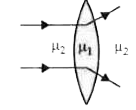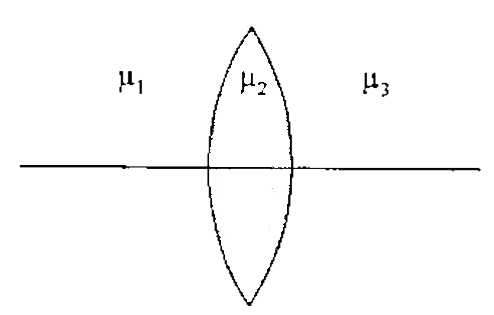A thin lens made of a material of refractive indexμ2 has a medium of refractive index μ1 on one side and a medium of refractive index on the other side. The lens is biconvex and the two radii of curvature have equal magnitude R. A beam of light travelling parallel to the principal axis is incident on the lens. Where will the image be formed if the beam is incident from (a) the medium p, and (b) from the medium μ3?
The correct Answer is:(a) μ3R2μ2−μ1−μ3, (b) μ1R2μ2−μ1−μ3
(a) For first refractiobn μ2v1−μ1−∞=μ2−μ1R
⇒v1=μ2Rμ2−μ1
for second refraction, this image is object.
μ3v−μ2v1=μ3−μ2−R
⇒μ3v−μ2−μ1R=μ2−μ3R⇒μ3v=2μ2−μ1−μ3R'⇒v=μ3R2μ2−μ1−μ3
(b) By interchanging μ1 and μ3,v=μ1R2μ2−μ3−μ1

Topper's Solved these Questions
- BOOK - RESONANCECHAPTER - GEOMATRICAL OPTICS EXERCISE - Exercise-263videos
GEOMATRICAL OPTICS
- BOOK - RESONANCECHAPTER - GEOMATRICAL OPTICS EXERCISE - Exercise-379videos
GEOMATRICAL OPTICS
- BOOK - RESONANCECHAPTER - GEOMATRICAL OPTICS EXERCISE - Problem33videos
GEOMATRICAL OPTICS
- BOOK - RESONANCECHAPTER - EXPERIMENTAL PHYSICSEXERCISE - PART -II10videos
EXPERIMENTAL PHYSICS
- BOOK - RESONANCECHAPTER - GRAVITATIONEXERCISE - HIGH LEVEL PROBLEMS16videos
GRAVITATION
Similar Questions
Knowledge Check
- Question 1 - Select One
A lens made of material of Refractive index μ2 is surrounded by a medium of Refractive Index μ1. The focal length f is related as
Af∝(μ2−μ1)Bf∝μ1(μ2−μ1)Cf∝(μ2+μ1)Df∝1(μ2+μ1) - Question 2 - Select One
A convex lens made up of material of refractive index μ1, is immersed in a medium of refractive index μ2 as shown in the figure. The relation between μ1 and μ2 is
 Aμ1<μ2Bμ1>μ2Cμ1=μ2Dμ1=√μ2
Aμ1<μ2Bμ1>μ2Cμ1=μ2Dμ1=√μ2 - Question 3 - Select One
An e.m. wave is travelling through a medium of refractive index μ1, and is incident on the boundary of a medium of refractive index μ2. IF the wave reflects at the boundary
AThe wave undergoes a phase change of 180∘ if μ1<μ2BThe wave undergoes a phase change of 180∘ if μ1>μ2CThe wave undergoes a phase change if μ1<μ2DThe wave undergoes a phase change if μ1>μ2
A thin lens made of a material of refractive index μ0 has a focal length f0 in air. Find the focal length of this lens if it is immersed in a liquid of refractive index μ.
View SolutionAn equiconvex lens of refractive index μ2 is placed such that the refractive :
 View Solution
View SolutionWhen a lens of power P (in air) made of material of refractive index μ is immersed in liquid of refractive index μ0 Then the power of lens is:
View SolutionIf a convex lens of refractive index μl is placed in a medium of refractive index μm Such that μl>μm>μair then
View SolutionA concave lens made of material of refractive index 1.6 is immersed in a medium of refractive index 2.0 The two surfaces of the concave lens have the same radius of curvature 0.2 m. The lens will behave as a
View Solution

